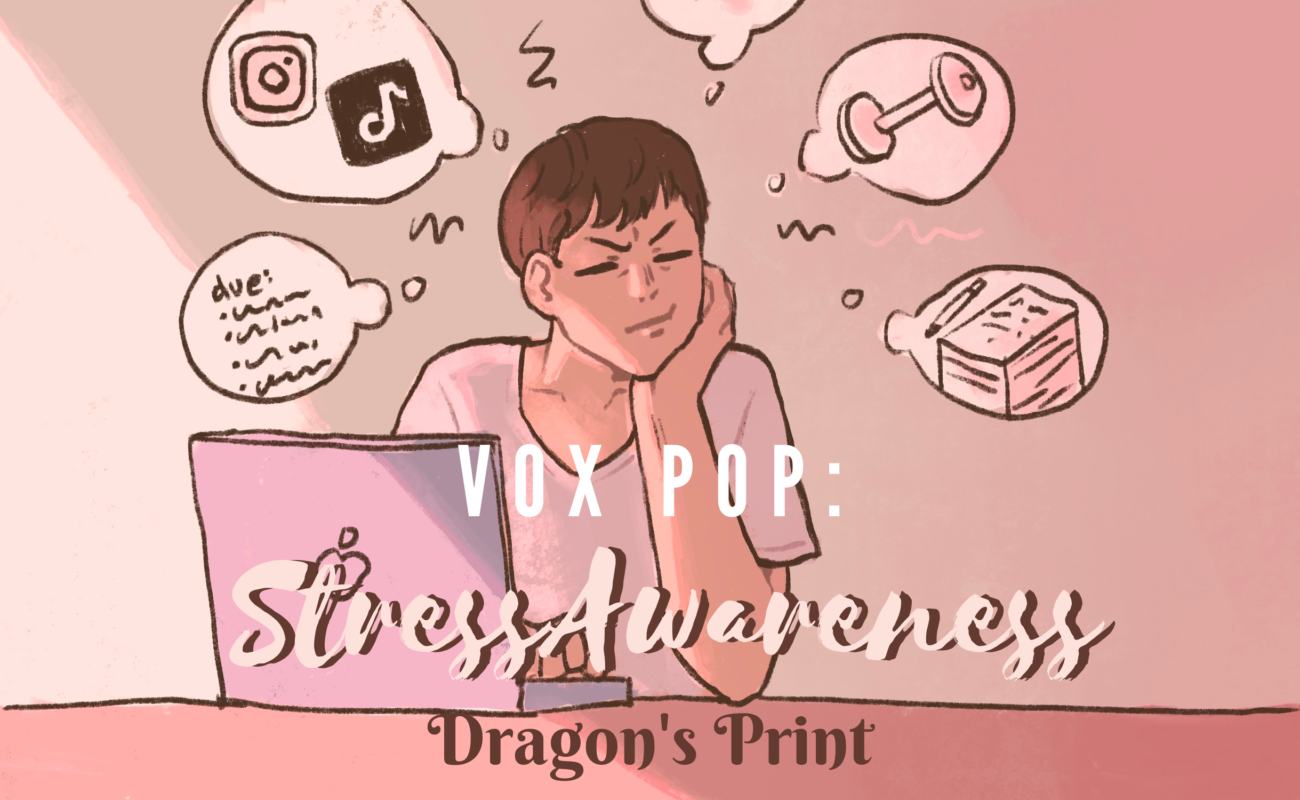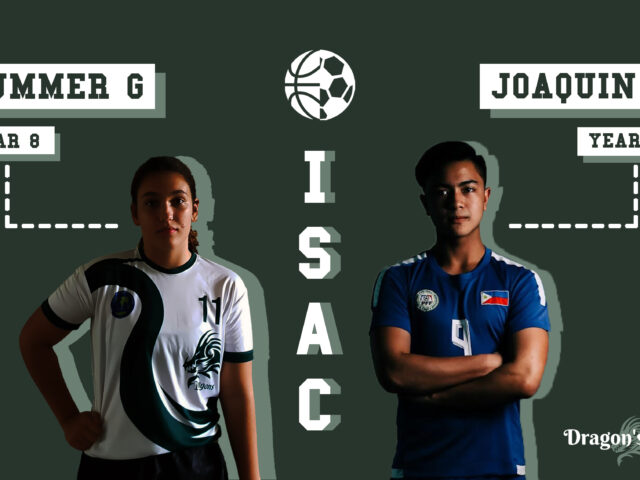Stress is a feeling that everyone is familiar with as there just seems to be a never-ending amount of projects, obligations, and summatives due all the time. That is why it is especially important to learn how to manage ourselves and stay calm during this time of uncertainty. Today is International Stress Awareness Day, so we decided to interview some students and teachers to see how they deal with stress—and hopefully help our readers be less stressed too! Here are their responses:


What do you do after a long day to wind down?
Deandra: After a long day, I try to get off my phone or my computer because for me, technology [is] associate[d] with school work. Instead, I try to bake and cook to relieve my stress because I just focus on what I’m doing at that moment and the best part is eating the finished product.
Jhon: I normally try to read (something that’s on paper) or take a walk outside because I want to stay away from electronics to clear my head.
Ms. Kohlmeier: Go for a walk, watch Netflix/YouTube, cook, pet our cats, or chat with friends or family.


How has the way you deal with stress changed during the pandemic? Has it changed?
Ms. Enrile: Dealing with stress actually changed during the pandemic. I actually have longer quiet times now to use for rest and reflection, so I take advantage of this. Each day is still fast-paced with online classes and preparations, but I always look forward to the time each day when I close my laptop and simply relax and read a good book.
Deandra: Before the pandemic, I usually would handle stress by watching YouTube videos, watching Netflix movies, and going on social media because those made me forget about what I was initially stressing about. I still do these things now, but since everything is based on technology because of the situation we are in, I try to relieve my stress by staying away from my gadgets. Actually, this is how I developed my love for baking and cooking because that is what I would be doing while staying away from my gadgets.
Jhon: I don’t think it has changed. Mostly my stress comes from schoolwork, not in a bad way but because there’s just deadlines you have to meet, especially as a senior. If I could state something that has changed in the way I manage my stress specifically during the pandemic, then I would say that I try to relieve stress more through physical movement rather than with my electronic devices.


What is one piece of advice you would give to those struggling with stress?
Ms. Enrile: Take deep breaths and spend time reflecting on what is causing your stress and how you can manage it effectively.
Deandra: One piece of advice that I would give is to be realistic. When you plan for activities to do in a day, make sure you are not giving yourself too many tasks. I [used to] do this (and sometimes still do it), but I realized that if I give myself the right amount of work for the day, I will feel accomplished when I complete all of it, rather than stressed when I am not able to finish too many goals that I have set for myself.
Masako: My advice is that you should give yourself a break and find some rewarding food. Taking naps also helps.


Do you think people should have more open conversations about the effects of stress?
Ms. Enrile: I think we should talk more about the effects of stress because sharing one’s experiences can be therapeutic. It also allows us to learn from one another and offer support when needed.
Deandra: Yes, I think that stress should not be treated as a taboo because everyone has experienced this feeling. Especially in a school setting, so many people could relate with each other when it comes to stress—from schoolwork, friends, family—and I think that if we were to talk about this more, we would be able to help each other out. It also allows people to know that even though they are stressing about something, they are not alone.


Can you recall a time where you were most stressed? How did you deal with it?
Masako: The time I was most stressed is the beginning of the year exam, because [those] exams contribute[d] to my anticipated grades. I dealt with it by eating food that made me feel happy and food that gave me energy. I also called a group of friends who [were] in the same subjects as me so that we could help each other out, which turned out pretty well.
Jhon: Well, I wouldn’t say I have a single time in which I was “most” stressed, but I think there were and are moments where stress that you weren’t so aware of hits you [all] at once. I think I deal with those moments by not doing anything on that specific day. This is because I believe that if you are just not in a mood to do something, you are not going to do it well anyways. This is personally true for me, as I know that when I’m not up to do something, my results will be mediocre which will then further ruin my mood to work.
Ms. Kohlmeier: One of my most stressful times was during graduate school. I had to write 10 research papers at the end of my studies, each 10-12 pages long. I am a procrastinator by nature, so the work really piled up and the deadline was constantly staring me in the face. I finally gave myself mini deadlines and wouldn’t allow myself to have any fun until I met my daily deadline. Having a reward at the end of the day really helped and I managed to finish just in time!


Do you have a kind of red warning flag that indicates that you are under too much stress?
Ms. Christine: When I do not have a deep sleep, it means that I am under too much stress.
Masako: Yes, my red flag is when I have a huge headache and I start to forget to eat.


Do you think stress is good for an individual?
Ms. Christine: I do not think that stress contributes to the well-being of a person, but we can definitely learn valuable life lessons as we manage stress positively.
Masako: Stress is both good and bad in my opinion. Stress is good because it helps people to get the job done. Stress is also bad because it becomes extremely taxing on our brain and body which could lead to mental health consequences and physical health issues.
Jhon: I think no one lives stress-free; I mean if they do, good for them. I think people always have this negative conception of stress and that we should avoid it. Yes, it is true that excessive and constant stress can lead to health complications, but I believe a moderate amount of stress is what helps people develop and achieve success. Think of it this way, when we are met with an obstacle, we struggle to overcome it. In this process we become stressed, but because we have this period of struggle and stress, we are able to figure out a solution and learn from the experience. I mean, imagine living with absolutely no difficulties; that’s privileged and lucky but I think at one point, it’s going to get boring. Then again, this is how I see it, so it might be different depending on the individual.
Ms. Kohlmeier: I think a manageable level of stress is good because it keeps us going and we also feel a sense of relief or even happiness when we get through a stressful time. What is not good for an individual is when there is constant stress or when stress causes someone to not sleep, eat, or take care of themselves properly.
In conclusion, stress is an emotional and physical feeling we all go through. It is part of human nature. This doesn’t mean that too much stress is a good thing, so we still have to learn our own way of dealing with it, like taking naps, dancing, watching our favorite shows/movies, or even snuggling with our pets. Finding that balance between work and play is an essential part of growth, and we are all responsible for helping both ourselves and others thrive in times of need.
That said, another effective way to de-stress is by reading books. It’s good to immerse yourself into a world with interesting characters and page-turning plots, and Book Week is a fun opportunity to sit down and relax with a good book. Dragon’s Print has also decided to join the fun and has prepared an entertaining book-themed bingo challenge for you on Instagram. Feel free to check it out and share it with your friends!
Lastly, we would like to thank the teachers and students who set aside some time in their busy lives to participate in this insightful interview.
We hope everyone is doing well and staying safe!
Article by Bella F. (Grade 9) and Jodi G. (Grade 11); Feature image by Marianne G. (Grade 9)
The views expressed in this article represent the personal views of the author and should not be taken to represent the views of Dragon’s Print and Cebu International School.
Image References:
Adeoye, A. (2017). Lady running in a park in London [Photograph]. Unsplash. Retrieved from https://images.unsplash.com/photo-1487956382158-bb926046304a?ixlib=rb-1.2.1&ixid=eyJhcHBfaWQiOjEyMDd9&auto=format&fit=crop&w=1051&q=80
Belt, D. (2019). Phone a friend [Photograph]. Unsplash. Retrieved from https://images.unsplash.com/photo-1564682895970-0dbb72e18d97?ixlib=rb-1.2.1&ixid=eyJhcHBfaWQiOjEyMDd9&auto=format&fit=crop&w=1051&q=80
Boekhorst, M. (2018). Insomnia [Photograph]. Unsplash. Retrieved from https://images.unsplash.com/photo-1540324506268-a839bb6c1254?ixlib=rb-1.2.1&ixid=eyJhcHBfaWQiOjEyMDd9&auto=format&fit=crop&w=1050&q=80
Bugaiova, V. (2018). And breathe [Photograph]. Unsplash. Retrieved from https://images.unsplash.com/photo-1528979180541-5ad1423e5852?ixlib=rb-1.2.1&auto=format&fit=crop&w=1050&q=80
Finn. (2020). Are you ok? [Photograph]. Unsplash. Retrieved from https://images.unsplash.com/photo-1581333100576-b73befd79a9b?ixlib=rb-1.2.1&auto=format&fit=crop&w=1234&q=80
Freestocks. (2018). Netflix [Photograph]. Unsplash. Retrieved from https://images.unsplash.com/photo-1522869635100-9f4c5e86aa37?ixlib=rb-1.2.1&ixid=eyJhcHBfaWQiOjEyMDd9&auto=format&fit=crop&w=1050&q=80
Glenn, K. (2017). Always room to grow [Photograph]. Unsplash. Retrieved from https://images.unsplash.com/photo-1506452985227-70bc78385fb0?ixlib=rb-1.2.1&ixid=eyJhcHBfaWQiOjEyMDd9&auto=format&fit=crop&w=1050&q=80
Gouw, T. (2016). Full focus at a coffee shop [Photograph]. Unsplash. Retrieved from https://images.unsplash.com/photo-1456406644174-8ddd4cd52a06?ixlib=rb-1.2.1&ixid=eyJhcHBfaWQiOjEyMDd9&auto=format&fit=crop&w=1048&q=80
Grabkowska, M. (2018). Baking [Photograph]. Unsplash. Retrieved from https://images.unsplash.com/photo-1540660290370-8aa90e451e8a?ixlib=rb-1.2.1&ixid=eyJhcHBfaWQiOjEyMDd9&auto=format&fit=crop&w=1100&q=60
Langford, S. (2014). Clock alarm [Photograph]. Unsplash. Retrieved from https://images.unsplash.com/37/tEREUy1vSfuSu8LzTop3_IMG_2538.jpg?ixlib=rb-1.2.1&auto=format&fit=crop&w=1050&q=80
Lin, K. (2017). After work [Photograph]. Unsplash. Retrieved from https://images.unsplash.com/photo-1495065315520-dc52af952505?ixlib=rb-1.2.1&ixid=eyJhcHBfaWQiOjEyMDd9&auto=format&fit=crop&w=1050&q=80
Morales, A. (2017). Read [Photograph]. Unsplash. Retrieved from https://images.unsplash.com/photo-1507842217343-583bb7270b66?ixlib=rb-1.2.1&ixid=eyJhcHBfaWQiOjEyMDd9&auto=format&fit=crop&w=1153&q=80
Swancar, A. (2019). Headache [Photograph]. Unsplash. Retrieved from https://images.unsplash.com/photo-1554188572-9d184b57d8e2?ixlib=rb-1.2.1&ixid=eyJhcHBfaWQiOjEyMDd9&auto=format&fit=crop&w=1267&q=80
Villasmil, L. (2020). Young man covered in sticky notes, work overload [Photograph]. Unsplash. Retrieved from https://images.unsplash.com/photo-1586473219010-2ffc57b0d282?ixlib=rb-1.2.1&ixid=eyJhcHBfaWQiOjEyMDd9&auto=format&fit=crop&w=1000&q=80
![]()




Leave a Reply